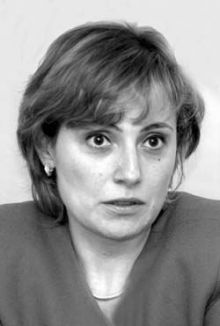In the past few days Israel has been in the spotlight of the world media. What is Israel’s vision of ways to defuse the current tensions in the Middle East and to resolve the Israeli-Palestinian conflict? What role can the world community and Ukraine play in this process? What is standing in the way of Israeli investments in Ukraine? This is the subject of an interview with Naomi BEN AMI, Ambassador Extraordinary and Plenipotentiary of the State of Israel to Ukraine.
“In the past few weeks your country has seen an escalation of the conflict over the kidnapping of an Israeli soldier. The UN Security Council’s Human Rights Committee has called on Israel to show restraint. Do you think it is possible in the nearest future to stabilize relations between the Palestinians and the Israelis?”
“I would like to note that many states voted against Israel in the Human Rights Committee without taking into account the rights of Israelis: they are also humans and also have rights. The decision was made against us. But we are very grateful to Ukraine for its role in this vote.”
“So far, Hamas, which is now in power, is not going to recognize Israel’s right to exist. What is Israel counting on — ‘reeducating’ or eliminating Hamas? Surveys indicate that quite a few Israelis opt for the latter way of resolving the conflict.”
“Israeli society is very democratic, with very different opinions from one pole to another. Undoubtedly, there are people in Israeli society who are ready to opt for more active and more militarized steps. But that does not mean that this will happen. The Israeli government adheres to rather balanced goals and positions. Therefore, it has not taken this kind of decision.”
“Does Israel hope to reeducate Hamas, and can this be helped by the referendum that will be held in Palestine?”
“I do not know if this referendum will be held. It is very difficult at the moment to forecast any steps that the Palestinian Autonomy may take. There was a Palestinian document that was basic for both Hamas and Fatah. It is still unclear whether [Palestinian president] Abbas has endorsed the final version. The document has been altered in the course of talks and does not include the three items of which the group of four international mediators spoke. Moreover, under the latest Palestinian agreements, this document calls for all kinds of actions against Israel on Israeli territory. All this indicates a departure from the principles originally laid out in the document. It is not clear what agreements exist and what may exist at this stage inside the Palestinian Autonomy.”
“There have been several agreements on solving the Middle East question: the Bush Plan during his first presidency, the Road Map, etc. What other plans should be adopted to resolve this problem once and for all?”
“The Road Map is the only plan that can resolve the Israeli-Palestinian conflict. But not even the first stage of this plan has been implemented. One of the chief provisions of this document is the cessation of terrorism. This was agreed upon a long time before Hamas came to power. To set the Road Map into motion, Hamas must fulfill three well-known conditions: recognition of Israel, recognition of the previous agreements on the Middle East settlement, and renunciation of armed struggle.
“After the elections, this organization recognizes neither Israel nor the unilateral concessions our country has made and is prepared to make. Furthermore, our proposals are very advantageous to the Palestinian people, i.e., for the future Palestinian state. But the Palestinian leadership is not prepared for concessions or for a balanced assessment because they do not imagine the existence of Israel as such on their political map.”
“Israel’s foreign minister recently visited Moscow. Did she raise the issue of that scandalous meeting between the leaders of Russia and Hamas? How does Israel assess Russia’s role in the process of solving the Middle East question? Russia is part of the group of four international mediators, along with the US, the EU, and the UN, trying to settle the Israeli-Palestinian conflict.”
“It is noteworthy that Russia has never put Hamas on the list of terrorist organizations. We were very disturbed when President Putin welcomed the Hamas delegation in Moscow. But the Kremlin explained that this was done to keep the door open for further contacts, if need be. Now it is really needed. This is why Israel’s foreign minister went to Moscow. If Russia is capable of influencing the situation, we consider that the moment of truth has arrived. We hope that Moscow will use all its leverage. But so far we see no results. We believe that this influence, as well as the influence of any other country, will bring positive results.”
“You have already mentioned Ukraine’s position during the vote in the UN Human Rights Committee. Does Israel need any concrete support from Ukraine in the Middle East settlement?”
“We would like Ukraine to apply all its opportunities and influence for these goals. I think there are some points that Ukraine could choose to demonstrate its readiness to combat international terrorism and its understanding that the nature of terrorism is the same everywhere, be it the Middle East or any other part of the globe. I think this is the main thing now.”
“How would you characterize Ukrainian-Israeli relations on the whole?”
“Relations between our countries are developing. The total trade turnover between our countries is about $500 million. Total investments, including indirect ones, have also reached the same figure.
“Politically, our relations are characterized by a large number of visits in the past few years, especially at the ministerial level. But unfortunately, the period after the 2005 presidential elections has been not so active. We are really looking forward to the formation of a new government in Ukraine, and we have planned some visits for the future.
“The publicized visit of President Yushchenko was postponed several times for various reasons. As of today, no concrete date has been fixed. We still hope the visit takes place. Naturally, the schedule for that visit will be very tight. The higher the level of the visit, the more important and interesting subjects can be discussed. The Orange Revolution sparked great interest in the Ukrainian economy on Israel’s part. Israeli businessmen began visiting Ukraine. Some of them put down roots and began to work. Unfortunately, expectations were not realized, first of all because of thwarted hopes for an improved law that would promote investments. Legislation has still not been normalized to the point that businessman can come here and work without fear.”
“In other words, Ukraine failed to create an attractive investment climate?”
“That’s right. The climate here is still not attractive. But we hope that it will be easier to invest in Ukraine. There are some Israeli businessmen here, who work very successfully. We are trying to attract and, if possible, to help any Israeli businessmen who want and are ready to work in various sectors here. We are focusing our attention in Ukraine on high tech and agriculture. We plan to send a delegation of telecommunications specialists. We are already working in this field, and it is interesting to businessmen on both sides. A lot can be done in the field of public health and medicine.”









